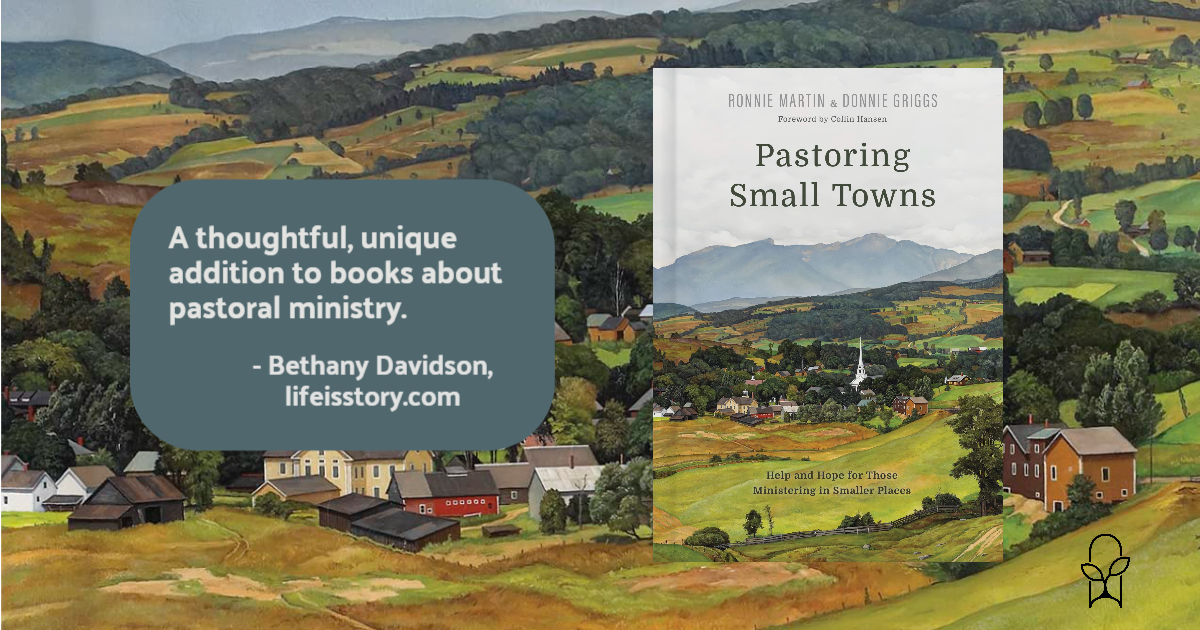
Also by this author: The Unhurried Pastor: Redefining Productivity for a More Sustainable Ministry
Published by B&H Publishing on April 11, 2023
Genres: Non-Fiction, Christian Life, Leadership
Buy on Amazon
Goodreads

Small town life is quite different from life in a big city. There is not as much traffic. People recognize each other at the grocery store. Local sporting events carry a different cultural weight, and it may not be out of the ordinary to wait behind a tractor or get used to the smell of a nearby factory. These communities are unique, and pastoring here is an extraordinary task.
Ronnie Martin and Donnie Griggs are well-aware of this reality. In Pastoring Small Towns, their hope is to equip pastors and ministry leaders to take on the different nuances that come with pastoring smaller communities. They point out the cultural realities of these places and give pastors the tools to effectively engage their people with the Gospel.
Many people forget about rural areas. Most church resources assume a suburban context, and people often think that if you want to really have an impact, then you need to change the world through urban ministry. Hardly anyone talks or writes about ministering to people in the country, and this book appealed to me as a refreshing departure from that norm. Ronnie Martin is a small town pastor in North Carolina, and Griggs pastors a rural church in Ohio. They share from their experiences throughout this book, encouraging fellow workers and setting expectations for future pastors who may be considering work in a small town.
Honest and Wise
Pastoring Small Towns is honest and helpful. Martin and Griggs share about the unique struggles of leading a small town church, when you are the go-to person for all of the local emergencies, can’t measure your success through growth or impressive attendance metrics, feel forgotten in larger discourse about pastoral leadership, and must navigate challenges related to powerful small town families who expect equal influence in the church as in town affairs. Martin and Griggs also reflect on some challenges associated with the pandemic, Christian nationalism, racism, and the opioid crisis. Overall, even though this book is brief, it addresses a lot of important factors in rural ministry and shares powerful, encouraging messages from Scripture about what it means to truly know, love, and shepherd people well.
Martin and Griggs did a great job describing common dynamics without relying on shallow stereotypes, and they grounded things in their personal experience without sharing too many details about their churches. I also found it insightful when one chapter warned against the risk of a pastor falling prey to a sense of celebrity. Since the authors mostly focused on pastors feeling discouraged and isolated in their small places, I thought it was wise that they also warned against the pride and self-importance someone can feel when they’re a notable figure in a small town.
On Leadership
My main critique of this book involves the chapter about developing new leaders. That chapter shares great wisdom about mentoring future leaders and dealing with challenges that are unique to or magnified in small towns, but even though it applies more generally, the advice is only oriented towards raising up men who will preach and teach. This neglects men who have no teaching skills but would be wonderful deacons to care for physical and emotional needs, and this neglects women who have leadership skills and can be of great service to the church. Even in the most strictly complementarian contexts, women still teach each other and minister to children, so I found it strange and surprising that there was nothing about female leaders in the leadership chapter.
Even though this book is very brief and can’t address every part of church life, there should have been material related to children’s ministry and women’s ministry. This is a huge omission, because even though some small churches may not have age-specific or gender-specific activities and programs, most will still have something of that nature, and a small-town pastor is far more responsible for overseeing this than he would be in a larger church, where different staff members will have different areas of focus. I wish the authors had addressed what children’s ministry and women’s ministry look like in rural contexts, how pastors can vet leaders for these callings, and how they can provide ongoing encouragement and healthy oversight.
Conclusion
Pastoring Small Towns: Help and Hope for Those Ministering in Smaller Places is a unique, helpful book for people who are ministering in small towns or considering future jobs in rural areas. The authors are honest, gentle, and insightful, sharing about potential problems with a spirit of grace and warning pastors against common issues that might arise in their own hearts. This book will be helpful for people in a variety of different circumstances, and while the expectation-setting chapters will be the most helpful for new and future pastors, the chapters at the end about endurance will encourage those who have already been serving for a long time. Although this book is brief and limited, it is a thoughtful, unique addition to books about pastoral ministry.
